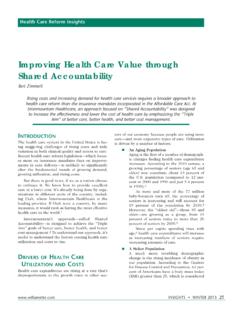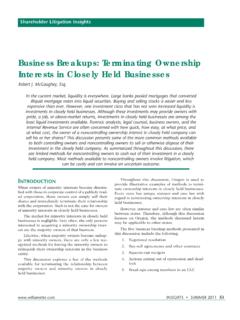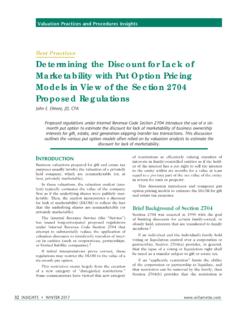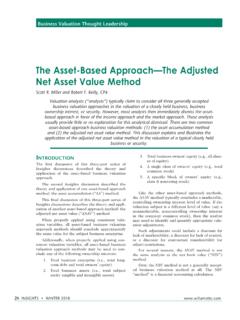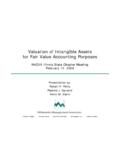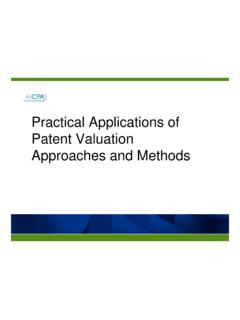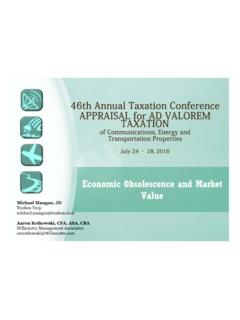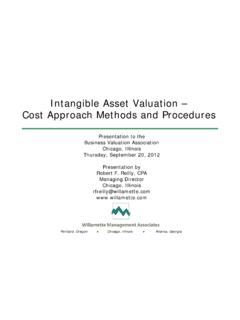Transcription of Valuing Stock Options in Compliance with Section 409A
1 64 insights autumn 2016 www .willamette .cominTroducTionInternal Revenue Code Section 409A applies to the compensation that is earned by an employee in one year but is paid in a future year, such as a nonquali-fied deferred compensation nonqualified deferred compensation plan is an arrangement between an employer and an employee to pay the employee compensation in the arrangements include the following:1. Nonqualified retirement plans2. Elective deferrals of compensation3. Severance and separation programs4. Post-employment payments provided for in an employment agreement5. Equity incentive programs, such as Stock optionsAccording to Section 409A, every time a corpo-ration issues a Stock option to an employee, there should be a valuation of the corporation s common Stock .
2 However, Section 409A does not provide a universally accepted valuation method to value employee Stock this reason, it is up to the employer and its advisers to elect a practical valuation method, or application, to estimate the fair market value of the employee Stock , it is common for analysts to apply an option pricing model to value employee Stock Options . This is because option pricing models allow analysts to assign probabilistic assumptions to ana-lyze contingent value of employee Stock Options is contin-gent on the economic circumstances that will exist in the future when the employee has the right to receive the 409a oVerVie WSection 409A requires that all compensation deferred for the taxable year and all preceding taxable years be included in gross income for the taxable year unless there is a substantial risk of 409A applies to all deferred compensa-tion that an employee earns for the
3 Taxable year and imposes severe tax penalties on noncompliant deferred compensation order to avoid noncompliant arrangements, company managements and their analysts should understand how to establish (1) the value of the shares that underlie the option and (2) the exercise price for the Stock arrangements may include the following:1. Stock Options and Stock appreciation rights that are granted with an exercise price below fair market value at the time of grantValuing Stock Options in Compliance with Section 409 AReid ChanonTax Valuation InsightsInternal Revenue Code Section 409A provides the income tax provisions related to deferred compensation including employee Stock Options .
4 Section 409A does not prescribe a universal methodology to value employee Stock Options . However, many analysts apply option pricing models such as the Black-Scholes option pricing model ( Black-Scholes ) or a binomial model to value employee Stock Options . This discussion provides (1) a summary of Section 409A and (2) an overview of common option pricing .willamette .com insights autumn 2016 652. Stock Options or Stock appreciation rights that are not affiliated with the common Stock of the company the employee works for or its parent company3. Rights that are added later to further defer the Stock option or Stock appreciation rights1 According to Section 409A, Stock Options and Stock appreciation rights that are noncompliant may result in significant unfavorable tax conse-quences for the employee and the example, the nonqualified deferred compen-sation in question will be fully taxable as soon as the employee has a vested right to receive it.
5 In addi-tion, a tax penalty of 20 percent may be pubLic and pri VaTe corporaTion sTockTo avoid unfavorable tax consequences under Section 409A, the exercise price of the Stock option must not be less than the fair market value of the underlying Stock as of the date of the following valuation guidelines are appropri-ate for both public and private corporation Fair Market Value of Public Company StockThe fair market value of Stock that is actively traded on an organized securities market may be based upon:1. the most recent sale price before the grant,2. the closing price on the trading day before the grant, 3.
6 The arithmetic mean of the high and low prices on the trading day before or the trad-ing day of the grant, or4. another reasonable basis using actual transactions in the Stock as reported by the the Fair Market Value of Private Company StockThe fair market value as of the date of the grant of Stock that is not traded on a reputable securities market is to be established by reasonable applica-tion of a recognized valuation reasonable valuation method may include one or more of the following considerations:1. The value of tangible and intangible assets of the company less its liabilities (an asset-based approach valuation analysis)2.
7 The present value of expected future cash-cash flow of the company (an income approach valuation analysis)3. Recent arm s-length transactions involving the sale or transfer of the subject Stock (a market approach valuation analysis)4. The market value of Stock or equity interest in similar companies (a market approach valuation analysis), based on:a. observable trading prices on an repu-table securities market orb. an amount paid in a recent arm s-length private transaction5. A method that is regularly used for other purposes that have a material economic effect on the company, its stockholders, or its creditors (which may include relevant factors such as ownership control price premiums or discounts for lack of market-ability)4A valuation method is not considered to be rea-sonable if:1.
8 It fails to reflect important information that is known or knowable as of the grant date that may materially affect the value of the corporation s Stock such as:a. the resolution of material litigation orb. the issuance of a patent, or2. the valuation date was more than 12 months prior to the date for which the valuation is being safe harbors for pri VaTe company sTockThe Internal Revenue Service (the Service ) may rebut this presumption by showing that the con-cluded value of company Stock was grossly unrea-sonable by the improper use of the valuation private company s use of a valuation method is presumed to be reasonable under the following three safe harbor Harbor IThe fair market value of the private company Stock is estimated by a qualified independent appraiser that has:66 insights autumn 2016 www.
9 Willamette .com1. met educational and experience requirements or2. a professional designa-tion recognized by the Secretary of requirements must be met 12 months prior to the date for which the valu-ation of employee Stock Options is being Harbor IIThe fair market value is based on a formula ( , multiple of book value or multiple of earnings or a combination of both) that is regularly used for other purposes that have a material economic effect on the company, its Stock -holders, or its Harbor IIIThe fair market value is estimated by a qualified individual who is not independent of the company.
10 However, this safe harbor provision usually applies only to illiquid Stock of a start-up empLoyee Stock opTion is a deriVaTiVe securiTy An employee Stock option is a derivative security whose value is contingent on the price of the com-pany Stock . A Stock option gives the holder the right, but not the obligation, to acquire Stock in a company within a specific time addition, a Stock option typically includes an exercise price and a stated expiration date. Unlike futures and forward contracts, Options do not have an obligation where final purchases are following discussion presents a brief descrip-tion of other common A forward contract is an agreement between one party to buy, and the other to sell, an asset at a predetermined price.

